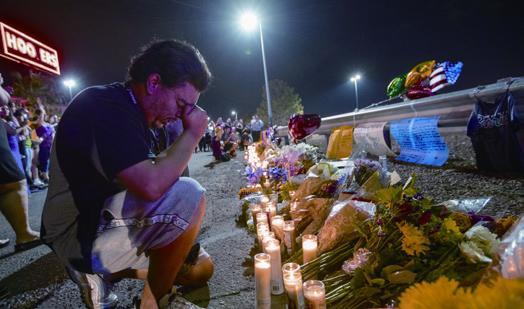Raging Gun Violence
By John S.Marshall,Gao Lu & Sun Ding

The U.S. marked a grim milestone in 2019: There were more mass shootings than there are days of the year. As of December 22, 2019, there had been 404 cases of mass shootings in the country, according to the Gun Violence Archive (GVA), a nonprofi t organization. This is the highest number registered since the group started collecting data in 2013.
The GVA defi nes a mass shooting as any incident that results in four or more people being shot, excluding the shooter.
Deadly year
According to the GVA, 14,801 people were killed and 28,613 people injured by guns across the U.S. as of December 22, 2019, omitting suicides.
It seems as though there is a mass shooting everyday somewhere in the country. In reality, there are usually a few days in between the next mass shooting, but people nonetheless have been dulled by what was once shocking news.
“My personal belief is that we are becoming hardened by the violence and callous patter in mass media,” said Gail McConnell, who worked as a prosecutor for 25 years in Texas before retiring.
The continual hype during any and all events, the harsh disregard for life in TV shows, movies and video games, the increasing isolation created by smartphones and the feeling of entitlement are contributing to this toughening, McConnell added.
Residents in Western states seem to be more comfortable with a so-called “gun culture,” McConnell said. In Texas, generally considered a gun-friendly southern state, many of its citizens look suspiciously upon gun control laws or anything perceived as a move to impinge upon the constitutional right to bear arms.
For example, Montgomery County officials have declared it a “gun sanctuary.” County commissioners voted 5-0 on November 19, 2019, in favor of a resolution that will “maintain citizens ability to keep and bear arms without the threat of adverse legal ramifications.” With the unanimous passage of the resolution, Montgomery, with a population of 570,000 people, became the most populous county in Texas to become a gun sanctuary, according to offi cials. Currently, there are more than 200 counties and 11 cities that have declared themselves gun sanctuaries across the country.
Hate crimes
The deadliest shooting in 2019 was in the U.S.-Mexico border town of El Paso, Texas, where 22 people were killed and 24 others wounded in a Walmart shooting rampage in early August. The case is being prosecuted as a hate crime. The shooter posted an anti-immigrant diatribe on an anonymous extremist message board, citing the Christchurch, New Zealand, mosque shooter who left 51 dead in March 2019 as an inspiration.
In April 2019, a man who opened fi re at a San Diego synagogue also posted a note online that was almost identical to one written by the Christchurch mass murderer. The letter—full of anti-Semitic language and praise for white supremacy—named the Christchurch killer and the man accused of fatally shooting 11 people inside a Pittsburgh, Pennsylvania, synagogue in October 2018 as inspirations for the attack.
Describing local peoples reaction to the El Paso shooting, William G. Weaver, professor at the Department of Political Science at the University of Texas at El Paso, said people were “dismayed, sad, somber and in disbelief” that the massacre happened in their secluded and safe city.
“The idea that a person would travel 600 miles to kill El Pasoans is what put the city in shock. The idea that a person would carry hatred such a distance to slaughter people in a city because it is overwhelmingly MexicanAmerican is incomprehensible to the citizens in our isolated and insular city,” he continued.
Scholars argue that such hate crimes are not a new phenomenon in U.S. history. However, they note that there have been a growing number of mass shootings that involve hate and hate bias in recent years.
Jon R. Taylor, political science professor and department chair at the University of Texas at San Antonio, said he believes the social and political reasons for hate crimes vary “from far-right political and racialist extremism to religious extremism and bias, to ethnic prejudice and anti-LGBTQ (lesbian, gay, bisexual, transgender and queer) bias.”
His view was echoed by Peter J. Li, associate professor of East Asian politics at the University of Houston-Downtown. According to Li, the number of hate crimes has increased since the 2016 general election, when Donald Trump was elected president.
However, Taylor added that the problem has more complicated roots, pointing out that there is only a very small segment of U.S. society that appears more susceptible to extremist rhetoric and acts on it. Although its diffi cult to completely stop it, public vigilance and education can really help to mitigate hate crimes.
No progress
The nearly daily drumbeat of news reports detailing mass shootings has stoked emotional and heated debates on how to end the carnage, from enacting stricter gun laws to banning certain types of weapons. However, little progress has been made in the legislative arena concerning gun control.
“There is a fairly simple political play at work here. Senate Majority Leader [Mitch] McConnell will not schedule votes on gun control proposals unless the White House is willing to say the president will endorse them,” said Clay Ramsay, a researcher at the University of Maryland.
“Whenever horrific events drive the issue forward, the White House stirs the pot on various partial gun control ideas. When the issue has less attention, the White House withdraws,” Ramsay added.
In November 2019, Attorney General William Barr alleged that efforts in Washington to pass gun legislation in the wake of a spate of deadly mass shootings during the summer had been derailed because of impeachment proceedings against Trump in Congress. Likewise, Trump and other Republicans have seized the moment to claim that gun control may have been enacted if Democrats werent pursuing the presidents impeachment.

CEOs from some of the best known U.S. corporations urged Congress on September 12, 2019, to act on gun violence in a letter that came several weeks after two mass shootings, which occurred hours apart in El Paso and Dayton, Ohio, and took 32 lives in total.
“Doing nothing about Americas gun violence crisis is simply unacceptable and it is time to stand with the American public on gun safety,” read the letter signed by the heads of 145 U.S. companies, including Airbnb, Twitter and Uber.
Specifi cally, they were asking the Senate to pass a bill to “require background checks on all gun sales” and a strong law that “would allow courts to issue life-saving extreme risk protection orders.”
“There are steps Congress can, and must, take to prevent and reduce gun violence,”read the letter. “We need our lawmakers to support common-sense gun laws that could prevent tragedies like these.”
Whats next?
Gun violence costs the U.S. $229 billion annually, amounting to 1.4 percent of the countrys GDP, a newly released study com- missioned by congressional Democrats reported.
According to Taylor, there are several things that could be done right now to reduce gun violence and still work within the U.S. Constitutions Second Amendment protections of gun ownership rights.
“The first would be the so-called red flag laws that prevent the mentally ill and convicted violent felons from owning or purchasing guns. While it wont stop all illegal ownership or purchases, its a start,” he said.
Taylor also supports mandatory background checks for all private gun purchases and a ban on assault-type weapons and personal ownership of bump stocks for these types of weapons.
Republican Senator Lindsey Graham and Democratic Senator Richard Blumenthal are working on a red fl ag bill, which would permit guns to be taken from people who act as if they are considering an attack or have known mental health problems. The White House has not gotten behind any measure so far, said Ramsay.
Looking into the future, both Taylor and Li predicted there will be no quick fi x to the gun violence problem. The continual patterns of mass shootings in the U.S. have created a high degree of entrenched political polarization between Republicans and Democrats.
In view of the fact that the U.S. Congress is divided, with the Democrats controlling the House of Representatives and the Republicans holding the majority in the Senate, there is little chance of a legislative breakthrough in gun legislation, experts said. With general elections slated for November 2020, experts predict no positive change in terms of gun violence.
“I would put the chances very low, perhaps 1 in 12,” said Ramsay, referring to the possibility of passing any gun-related legislation in the election year.
“There is a real need to engage in an informed, value-based discussion on gun use and ownership in the U.S. Sadly, that isnt going to happen in an election year and likely wont happen after the presidential election, no matter who wins, because the two positions are so politicized that they make it diffi cult to address the problem of gun violence in the U.S.,” commented Taylor.

